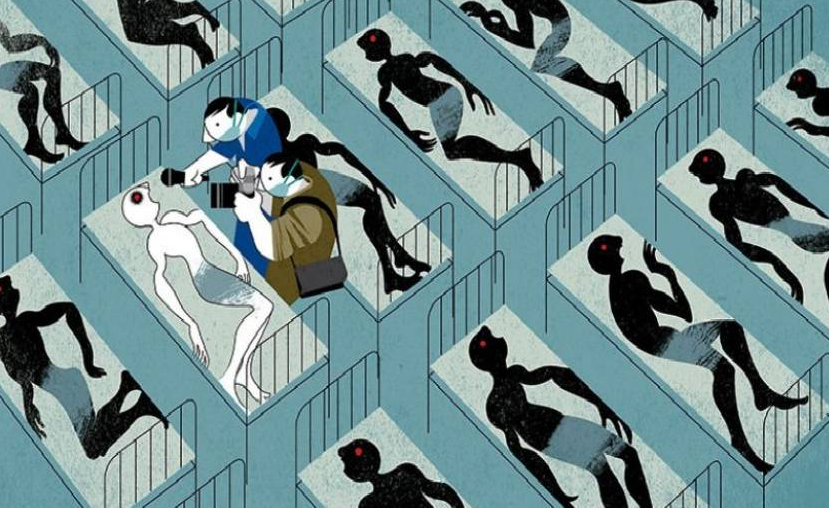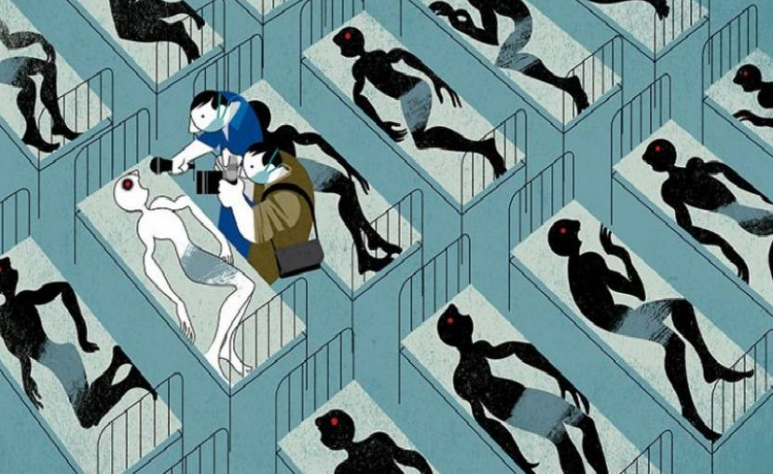Published: 14 November 2014
Region: Worldwide
 Since its outbreak, Ebola became a source of sensationalist headlines for many media outlets all over the world, particularly in the US. Bias and inaccuracy followed frequently the coverage of this deadly virus. There is a lot of criticism that the coverage on Ebola is being forged with paranoia, racism and xenophobia.
Since its outbreak, Ebola became a source of sensationalist headlines for many media outlets all over the world, particularly in the US. Bias and inaccuracy followed frequently the coverage of this deadly virus. There is a lot of criticism that the coverage on Ebola is being forged with paranoia, racism and xenophobia.

International Federation of Journalists (IFJ), Federation of African Journalists (FAJ) and the West Africa Journalists Association (WAJA) called on International media to exercise balanced and proper coverage of the outbreak of Ebola virus disease in West Africa.
Newsweek magazine cover featured the image of a chimpanzee with the title “A Back Door for Ebola: Smuggled Bushmeat Could Spark a U.S. Epidemic.”. Writers of the story went to visit African markets inside of the Bronx community looking for bushmeat. They suggest that this African delicacy which is transported illegally in America could be the source of Ebola outbreak.
The Newsweeks report outraged the blog group Africa is a Country on Twitter: “When clickbait, racism and dog whistling to white American readers meet on @Newsweek cover”.
A few days later, Washington Post reacted to Newsweek’s report. “Far from presenting a legitimate public health concern, the authors of the piece and the editorial decision to use chimpanzee imagery on the cover have placed Newsweek squarely in the centre of a long and ugly tradition of treating Africans as savage animals and the African continent as a dirty, diseased place to be feared”, wrote Laura Seay and Kim Yi Dionne for Washington Post.
They added that there is no evidence that the bushmeat can be the cause of Ebola spread, but it is an attempt to portray Africans as “savages”, who were not as “civilized” as their colonizers:
“Newsweek’s use of a chimpanzee to represent a scientifically invalid story about an African disease is a classic case of othering. It suggests that African immigrants are to be feared, and that apes — and African immigrants who eat them — could bring a deadly disease to the pristine shores of the United States of America.”
Newsweek cover drew also the criticism of the media watch group Fair.
“But the problems of the piece were bigger than just the cover. The piece is built around the idea that illegally imported “bushmeat”–what we would call “wild game” if it were being eaten in the United States–could carry the deadly Ebola virus”, Fair observed.
Different opinions and reports on media criticising Obama’s approaches towards the preventive health strategies regarding Ebola didn’t spare the insensitive remarks suggesting that the government is compensating for colonialism by not preventing Americans from Ebola.
The Fox opinionist Betsy McCaughey published the article: “Ebola crisis: Team Obama takes politically correct approach, ignores science”. She criticises isolation and prevention policies of people returning from Africa. As the title suggests, she points that Obama administration’s half-way approach is based on political correctness. It ignores the science.
According to Media Matters for America, Laura Ingraham suggests Obama Is Willing to Expose American troops to Ebola to atone for colonialism. In her 26 September edition of “The Laura Ingraham Show” she said: “The military is just another tool in his arsenal to level the playing field, right? I mean, in other words, Africa really deserves more of America’s money because we’re people of privilege. We’re people of great privilege, so we should do what we can, we the American taxpayers, to transfer wealth over to Africa. It’s his father’s rage against colonialism, as Dinesh D’Souza wrote about, and maybe this is a way to continue to atone for that.”
Dr. Keith Ablow, member of Fox News Medical A-Team on his article published on Fox website “Ebola outbreak: Why Obama is allowing Ebolaphobia to spread” wrote: “I believe the president may literally believe we should suffer along with less fortunate nations…..I think he sees himself as a citizen of the world and sees Americans as having infected others with our deadly economic policies for a long time, thereby inflicting untold suffering on developing nations.”
The Ebola paranoia spread to the halls of journalistic departments in America causing a lot of criticism. The Syracuse University disinvited three-time Pulitzer Prize-winning photojournalist, Michel du Cille of The Washington Post from participating in a journalism program. He returned from covering Ebola in Liberia and was diagnosed as symptom free.
“I am disappointed in the level of journalism at Syracuse, and I am angry that they missed a great teaching opportunity. Instead they have decided to jump in with the mass hysteria,” du Cille told News Photographer magazine.
Another similar situation happened at South Florida University St. Petersburg. The university invited but then cancelled the invitation for 14 journalists from African countries for the annual Edward R. Murrow Visiting Journalists program.
“’Fearbola’ has no place at journalism schools. There’s simply too much well-reported information available to justify these jelly-spined responses,” concludes the Poynter Institute.
Ona powerful illustration by Andre Carillho says precisely what is wrong with how the West talks about Ebola. ““People in the African continent are more regarded as an abstract statistic than a patient in the US or Europe,” Carillho told Mic. “How many individual stories do we know about any African patients? None. They are treated as an indistinguishable crowd.”
